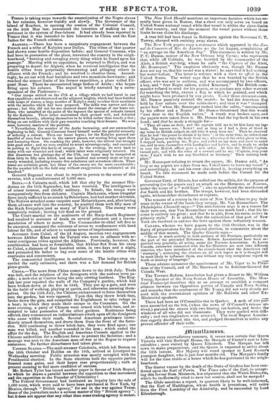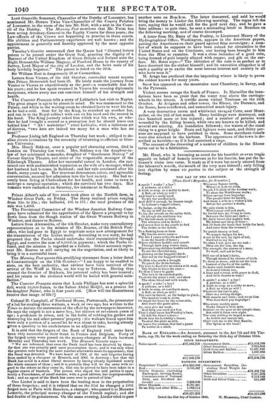4111isteltaneous.
After many contradictory rumours, it seems now certain that Queen Victoria will visit Burleigh House, the Marquis of Exeter's seat in Lin- colnshire; once visited by Queen Elizabeth. The Marquis has left town to make preparations, and the Queen is expected to arrive about the 12th instant. Her Majesty will stand sponsor to Lord Exeter's youngest daughter, who is just four months old. The Marquis's family will for the time reside at a house which he has purchased in the neigh- bourhood.
The Garter vacant by the death of the Duke of Grafton has been con- ferred upon the Earl of Powis. The Times asks if the Earl, in accept- ing this favour from Ministers, has stipulated that the Welch Bishopric, which he ineffectually tried to save last session, shall not be merged?
The Globe mentions a report, in quarters likely to be well-informed, that the Earl of Haddington, whose health is precarious, rill retire from the First Lordshigof the Admiralty, and be succeeded by Lord Ellenborough.
Lord Granville Somerset, Chancellor of the Hatay of Lancaster, has nominated Mr. Horace Twiss Vice-Chancellor of the County Palatine of Lancaster, in the room of the late Mr. Holt, with a seat in the Coun- cil of the Dutchy. The Morning Post mentions that Mr. Twiss has been acting Attorney-General in the Equity Courts for three years; the Law-officers of the Crown not happening to practise in those courts. His abilities and Parliamentary experience are well known ; and the appointment is generally and heartily approved by the most opposite parties. Tuesday's Gazette announced that the Queen had "directed letters patent to be passed under the Great Seal, granting the dignity of a Baronet of the United Kingdom of Great Britain and Ireland unto the Right Honourable William Magoay, of Postford House in the county of Surrey, Lord Mayor of the city of London, and the heirs male of his body lawfully begotten." The patent is dated on the 28th.
Sir William Nott is dangerously ill at Carmarthen.
Letters from Vienna, of the 22d October, contradict recent reports that Prince Metternich had been ill. He lately made the journey from Venice to Vienna as expeditiously as the post—a remarkable feat for his years ; and be has again resumed in Vienna his evening diplomatic receptions, where every one can convince himself of his strength and health.
The Courrier Francais tells a story of Lablache's last visit to Naples. The great singer is apt to be absent in mind. He was summoned to the Palace, and while in the waiting-room he obtained leave to wear his hat, as he had a cold. Sent for by the King, he snatched up another hat, and ran in to the Royal cabinet with one on his head and the second in his hand. The King jocosely asked him which was his own, or whe- ther he had brought a second as a precaution lest he should leave one behind him ? " Ah ! maledetto! " cried Lablache, with a ludicrous air of distress, "two hats are indeed too many for a man who has no head!"
Professor Liebig left England on Thursday last week ; obliged to de- cline divers invitations by the necessity of returning to officiate at Gies- zen University.
Mrs. Henry Siddons, once a popular and charming actress, died in London on Thursday last week. Mrs. Siddons was the daughter-in- law of her celebrated namesake, daughter of "Gentleman Murray" of Covent Garden Theatre, and sister of the respectable manager of the Edinburgh Theatre. After her successful career in London, she sus- tained one with undiminished reputation as the wife of a manager, which her husband had become, in Scotland ; and her rule continued after his death, many years ago. Her decorous demeanour, talent, and agreeable conversation, secured her admission into the best society. She had re- cently been living at Cheltenham for her health, and came to town to undergo a surgical operation ; which she survived but two days. Her remains were embarked on Saturday, for interment in Scotland.
Prince Albert's sale of live stock took place at the Norfolk farm, in Windsor Great Park, on Friday. The sheep realized prices ranging from 228. to 338.; the bullocks, 101. to 17!.: the total produce of the sale was 1,4001.
The Provisional Committee of the Windsor Junction Railway Com- pany have submitted for the approbation of the Queen a proposal to lay down lines from the Slough station of the Great Western Railway to Windsor, and thence to Staines.
Letters from Alexandria, of the 6th October, make very contradictory representations as to the mission of Mr. Bourne, of the British Post- office, who bad gone to Egypt to negotiate some new arrangement for the transmission of the Indian mails. According to one story, he had proposed that the Pacha should undertake their transmission through Egypt, and receive the sum of 6,000/. in payment ; which the Pacha re- fused, and the mission is regarded as a failure. Other accounts repre- sent Mr. Bourne as still carrying on the negotiation, and as likely to bring it to a successful issue.
The Morning Post quotes this gratifying statement from a letter dated at Constantinople on the 17th Oetober—" I am happy to be enabled to state, on the best authority, that advices have been received of the arrival of Dr. Wolff at Meru, on his way to Teheran. Having thus crossed the frontier of Bokhara, his personal safety has been insured ; and his return to the civilized world will be hailed with general satis- faction."
The Courrier Francais states that Louis Philippe has sent a splendid doll, worth 10,000 francs, to the Sultan Abdul Medjid, as a present for his daughter Naime, who is four years old. [How will tne Mussulmans receive that image of life ?] Colonel H. Campbell, of Northend House, Portsmouth, the prosecutor of a lad for stealing three walnuts, a week or two ago, has written to the Times to declare the statements of the affair by the newspapers incorrect. He says the culprit is not a mere boy, but sixteen or seventeen years of age ; a proficient in crime, and in the habit of robbing his garden and destroying his and other persons' property : the walnuts found upon him were only a portion of a second lot he was about to take, having already given a quantity to his confederates in an adjacent lane.
It is said that the forgers of the Bank of England 100/. notes have been very successful in their fraud in France and Belgium. Forty of the Gorged notes were passed on the money-changers of Paris between Monday and Thursday last week. The Brussels Gazette says- 4. We are informed, that even the Bank itself has been deceived by them ; for that one was actually paid upon presentation there, and it was only when the genuine note bearing the same number afterwards made its appearance' that the fraud was detected. We have heard of 700/. of the said forgeries having been cashed by a changeur at Brussels, and 2001. in Antwerp ; but that the Bank has acted in a most liberal manner by having already liquidated nearly the whole amount of these ; and it is probable they will do the same with re- gard to the others as they come in, that can be proved to have been taken in a regular course of business. The person who duped the said parties is appa- rently a Frenchman, of small stature, with a good address, but unprepossessing look ; and an agent of the Bank has come over in pursuit of him.'
One Linder is said to have been the leading man in the perpetration of these forgeries ; and it is related that on the 21st he changed a 1004 forged note at Paris with Bouchon, a changer ; who passed it to Madame Lemeric, the principal money-changer of the French capital ; and she had doubts of its genuineness. On the same evening, Lindor tried to pass another note on Bouchln. The latter demurred, and said be won't bring the money to Lindor the following morning. The rogue left the note, saying that he would call for the gold next day, and he gave a false address : to gain time, he sent a misleading letter to Bonchon oa the following morning, and of course decamped.
A letter from Mr. Bates of the Poultry, to Lieutenant Maury of the Hydrographical Office, Washington, appears in the American papers, putting the Americans on their guard against false sovereigns ; a num- ber of which he supposes to have been coined for circulation in the United States and on the Continent, one having been brought to him from the Mint to examine. It was a close imitation of a good coin, being formed of gold largely alloyed with copper, and gilt on the sur- face. Mr. Bates says—" The imitation of the coin is so perfect as to have deceived the die-sinker himself; and its execution altogether is of such a quality as to excite the most intense interest and anxiety in all who have seen it."
M. Arago has predicted that the impending winter is likely to prove the coldest known for many years.
Snow has appeared on the mountains near Chambery, in Savoy, and in the Pyrenees.
Violent storms ravage the South of France. In Marseilles the inun- dations have been so great that the water rose above the carriage- wheels in the streets. A terrific storm visited Toulouse on the 24th October. At Avignon and other towns, the Rhone, the Durance, and the Saone, have overflowed, and committed much injury.
A very destructive storm and whirlwind ravaged Cette, near Mont- pelier, on the 22d of last mouth. Many buildings were destroyed, and two hundred more or less injured ; and a number of persons were wounded by the falling houses while two are known to be killed, and several are missing. An inundation followed ; the waters of the canal rising to a great height. Boats and lighters were sunk, and thirty per- sons are supposed to have perished in them. Some merchant-vessels were also wrecked in the harbour. The appearance of the town is de- scribed as horrible—as if it had sustained a siege.
The account of the drowning of a number of children in the Rhone- turns out to be a fabrication.



























 Previous page
Previous page